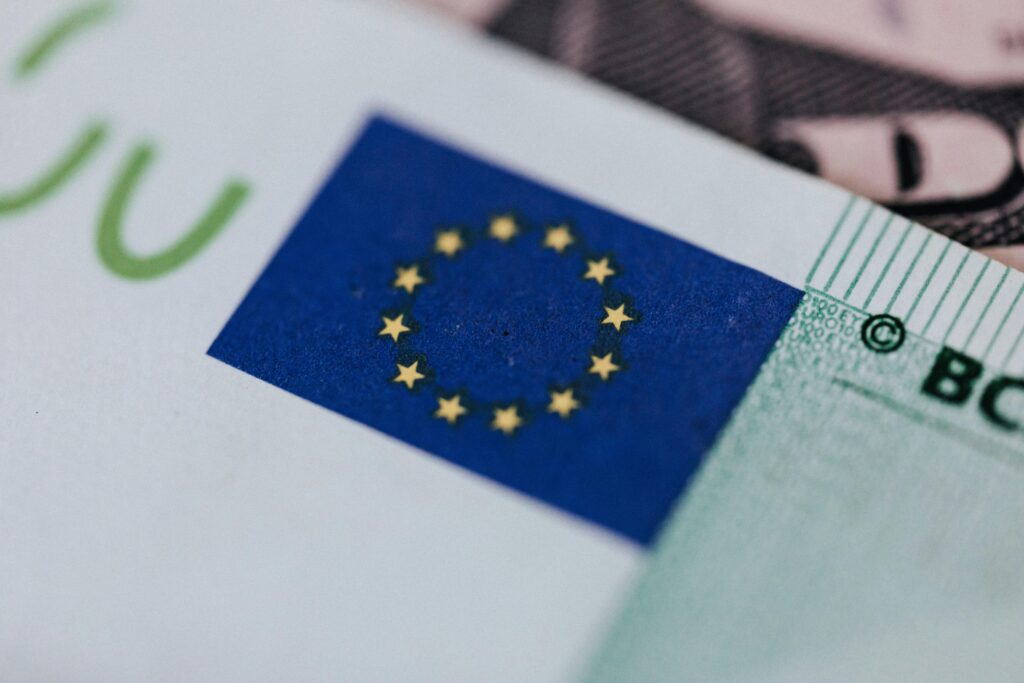On the 18th of July 2024, Ursula von der Leyen secured a second term as President of the European Commission. During her campaign, she outlined some political guidelines as a roadmap for the new European Commission mandate 2024 – 2029.
The EU is facing significant geopolitical and security challenges as well as economic stagnation, low competitiveness, and technological priorities coming from the rapid development of artificial intelligence. In this analysis, we discuss the key priorities of the second term of Ursula Von Der Leyen as President of the European Commission, and how these are likely to be pursued, and the implications for governments and the private sector.
Understanding the New European Commission Term ( Von der Leyen II)
There are three documents that would help anyone interested in understanding the agenda for the second term of Von der Leyen as President of the European Commision and in general the challenges that the EU faces in the next five years.
Three foundational documents inform the Commission’s agenda for this term:
- Von der Leyen’s Political Guidelines
- Draghi’s “The Future of European Competitiveness” report
- Letta’s “Much More than a Report”
These documents collectively establish the policy framework for addressing current challenges while positioning the EU for future developments. They were published almost in unison. The Commission’s Political Guidelines outline specific implementation timelines and measurable targets. The Draghi report, “The Future of European Competitiveness,” provides economic analysis and market projections. The Letta report offers complementary policy assessments, particularly regarding social and environmental objectives. They demonstrate that the EU is at a defining moment in its history where policymaking is being shaped in new paradigms and new directions. With a newly elected leadership in key EU institutions, there is an expectation of innovative policy-making that reflects both the expectations of member states and the needs of citizens. Building on these guidelines on the 29th of January 2025, the European Commission presented the EU Competitiveness Compass. This represents a clear strategy towards a path where Europe is to become a place where future technologies, services, and clean products are invented, manufactured, and put on the market while being the first continent to become climate-neutral.
Key Priorities of the New Presidency of the European Commission EU Term

A plethora of initiatives have been proposed, giving new impulse to the EU’s future direction. Below, we highlight the main pillars, first the ones that define its economic prospects, and later the ones that define societal growth.
- Economic Framework
Europe faces significant challenges such as unfair competition, energy price volatility, and skills shortages. To address these, the EU proposes a vision of a resilient European economy incorporated in the new European Prosperity Plan focused on several key areas:
- Enhancing the efficiency of the Single Market: the aim is to facilitate easier business operations by completing the Single Market across various sectors, including services and energy, and introducing supportive competition policies to ensure a level playing field for all companies.
- Clean Industrial Deal: this is a reinforced commitment to decarbonisation. Not only does it aim to support industries in meeting climate goals but also enhances job quality. This will involve investments in clean technologies and infrastructure to reduce emissions and energy costs.
- Boosting Research and Innovation: the objective is that of positioning research and innovation at the forefront of Europe’s economy, enhancing funding for strategic research, and launching initiatives like a new European Biotech Act to facilitate the application of biotechnologies.
- Investment in Digital Technologies: seeking to counter Europe’s lag in productivity through better diffusion of digital technologies, it includes enforcing digital regulations and promoting investment in frontier technologies such as AI, quantum computing, and supercomputing.
- Addressing Skills and Labor Gaps: to enhance investment in education and training, a Union of Skills will be established. The focus will be on lifelong learning, STEM education, and vocational training. Europe faces a significant skills gap that must be targeted to meet the changing demands of the economy.
- Capitalizing on Public Procurement: the goal is to maximize public procurement efficiency, prioritizing European products while simplifying regulations to better support start-ups and innovative firms.

- Security Framework
European defence and security in the wake of increasing threats needs a robust approach. The War in Ukraine has shed light on the inadequacies in European defence spending compared to threats from countries like Russia and China. And the role the USA wants to play in this sector is changing as well. This increases the feeling of instability. Creating a European Defense Union is seen as a viable solution. This will include appointing a Commissioner for Defense and producing a White Paper on the Future of European Defense to identify investment needs and unify efforts.
Key priorities involve:
- increasing defence budgets,
- strengthening the EU-NATO partnership
- fostering a collaborative defence industry through joint procurement initiatives.
Significant investment in high-end defence capabilities is needed to address common threats, with a focus on projects like a European Air Shield and enhancements in cyber defence. Additionally, a plan for a Preparedness Union Strategy to bolster crisis and security preparedness, including improved capabilities in addressing chemical, biological, radiological, and nuclear (CBRN) threats and enhancing cyber defence, is outlined. To combat organised crime and terrorism, a new European Internal Security Strategy will enhance cooperation among law enforcement agencies, strengthen the European Arrest Warrant, and bolster Europol’s operational capabilities.
On borders and migration, von der Leyen II advocates for a comprehensive approach to secure EU borders while guaranteeing that the rights of migrants are upheld. The implementation of the Pact on Migration and Asylum will be prioritized to provide a fair and orderly migration process, focusing on strategic relations with non-EU countries and enhancing cooperation on returns. This comprehensive strategy aims to ensure Europe is both safe and secure while promoting legal migration pathways to meet labour market needs.
- Foreign relationships framework
Europe needs to assertively pursue its strategic interests amid rising geopolitical tensions and instability, such as Russia’s aggression towards Ukraine, ongoing conflicts in the Middle East and authoritarian regimes.
To address these complexities, she advocates for a strengthened partnership with like-minded allies, particularly in the G7, such as the UK, and highlights the importance of EU enlargement, after marking 20 years of the start of this process, as a geopolitical imperative to enhance the Union’s security and influence. Furthermore, von der Leyen proposes a more strategic approach—not only to enlargement but also to the EU’s neighbourhood, focusing on economic stability, energy, and migration in the Mediterranean region.
- Social Development Framework
Recent crises have impacted many Europeans, highlighting the need to sustain and improve the current quality of life by promoting equal opportunities and quality jobs. Taking into account these emerging situations, a new Action Plan will be introduced to implement the European Pillar of Social Rights, addressing the impacts of digitalisation on work, including mental health concerns.
The European Commission proposes a Quality Jobs Roadmap to ensure fair wages and working conditions, increase collective bargaining, and enhance funding for just transition initiatives. President Von der Leyen appointed a Commissioner for Housing to tackle the rising housing crisis, proposing a European Affordable Housing Plan that includes measures to increase investment in social and affordable housing. To combat societal inequalities and demographic challenges, von der Leyen stresses the need for a strengthened cohesion and growth policy centered around regional partnerships.
Moreover, the EU Commission President aims to reunite society by improving intergenerational fairness, supporting youth involvement through initiatives like the Erasmus+ program, and establishing a President’s Youth Advisory Board to amplify young voices in decision-making.
- Agricultural and Environmental Framework
Europe’s 9 million farms are essential for both regional and global food security, yet they face significant pressures from climate change, global competition, and economic challenges. To combat these issues, von der Leyen II plans to engage stakeholders in creating a resilient agricultural system, focusing on fair income for farmers and support for family farms and sustainable practices.
President Von der Leyen also focused on the fishing sector, proposing the appointment of a Fisheries and Oceans Commissioner in order to boost the so-called blue economy while promoting sustainability. A European Oceans Pact will aim to enhance the blue economy and protect ocean resources. Additionally, von der Leyen emphasizes the importance of safeguarding natural ecosystems, like forests and wetlands, for climate regulation and food security. The European Civil Defence Mechanism will bolster community resilience amid increasing climate challenges. In terms of water security, a new European Water Resilience Strategy will address climate-related stress and ensure sustainable management of water resources. This strategy aims to enhance the competitiveness of the water industry and promote a circular economy, while also supporting efforts to mitigate global water stress.
- Democratic governance

Recognizing that democratic systems face increasing threats from both internal and external actors, von der Leyen II proposes the establishment of a “European Democracy Shield” to combat foreign information manipulation and disinformation campaigns. This initiative aims to
enhance digital literacy, improve fact-checking networks, and implement stringent measures against misleading information, in alignment with the Digital Services Act.
Moreover, von der Leyen II highlights the necessity of upholding the rule of law as fundamental for a functioning democracy and a resilient economy. She plans to strengthen monitoring mechanisms and improve the enforcement of rule-of-law principles across all EU member states, including the connection between EU funding and adherence to these principles. Furthermore, she stresses the importance of media freedom amid rising disinformation and pledges to support independent journalism through the implementation of the European Media Freedom Act.
To foster a more participatory democracy, embedding citizen engagement in EU policy-making is seen as key. Following up on recommendations from European Citizens’ Panels and enhancing collaboration with civil society organizations is crucial to bolster public trust and responsiveness within the Union.
Challenges Facing the EU
Externally, the EU must navigate a complex web of pressures, including heightened migration flows driven by geopolitical instability in neighbouring regions. The ongoing challenges of integrating migrants and asylum seekers complicate social cohesion within member states. Furthermore, global trade tensions—particularly those involving key partners such as the United States and China—require a robust and coordinated EU strategy to protect the integrity of the Single Market and ensure competitive positioning on the global stage. The EU must balance maintaining strong trade relationships while upholding its standards and values, which can often lead to difficult negotiations.
The European Union faces significant internal challenges that threaten its stability and unity. Rising populism within several member states has led to scepticism about EU institutions and policies, undermining collective decision-making processes. Political movements that focus on national interests over supranational cooperation may lead to fragmentation, making it increasingly difficult to achieve consensus on critical issues ranging from migration to climate change.
Economic disparities between northern and southern member states create an uneven playing field, complicating efforts to foster collective growth. Southern economies, often grappling with high unemployment and public debt, are contrasted with the relatively stable economies of northern countries. This economic divide fuels resentment and hinders consensus on fiscal policies, making it challenging to develop a cohesive economic strategy that benefits all member states.
Implications for Member States and Policymakers
To effectively address these challenges and implement the priorities of the Von der Leyen II, EU Member States must commit to a collaborative approach to policy-making. This entails creating a framework that not only aligns with EU-wide objectives but also considers the unique circumstances and needs of individual countries.
- Closer cooperation will be required from the policymakers to develop policies that drive economic growth while reducing disparities between regions. This could involve targeted investment in less prosperous areas and fostering partnerships that encourage knowledge-sharing and best practices.
- The push for increased defense spending and joint procurement represents a major shift in the European security landscape. Governments will face budgetary and political challenges.
- Adaptability will be crucial as member states navigate a rapidly evolving political landscape driven by shifting public sentiments and external pressures. Policymakers will need to be agile in their responses, continuously reassessing and adjusting strategies to meet emerging challenges. This requires an iterative approach to governance that prioritises flexibility and real-time adaptation to new data and public feedback.
- Increasing citizen engagement is essential for rebuilding trust in EU institutions and ensuring that all voices are represented in the decision-making process. Mechanisms for citizen participation, such as public consultations and participatory democracy initiatives, should be expanded to include diverse demographics, particularly marginalized communities.
In summary, addressing the EU’s challenges will require a multifaceted approach that fosters unity, responsiveness, and inclusive participation from all member states and citizens alike.
Implications for the Private Sector
The European Commission’s new term priorities present both opportunities and challenges for the private sector.
- The focus on enhancing the single market, boosting research and innovation, and investing in digital technologies offers significant potential for growth and investment. However, the private sector needs to adapt to the EU’s ambitious climate goals, navigating the “Clean Industrial Deal” and related policies. This will require significant investment in clean technologies and sustainable practices.
- The strengthening of the EU’s defence industry through joint procurement initiatives could create significant opportunities for companies involved in defence-related technologies. Conversely, companies operating in sectors potentially impacted by increased regulation or shifts in the policy landscape, such as energy or migration, need to anticipate and adjust to meet evolving requirements strategically.
- The EU’s heightened focus on digital security necessitates that companies prioritize and significantly strengthen their cybersecurity measures across all aspects of their operations. This includes increased investment, compliance with regulations, employee training, supply chain security, incident response planning, and collaboration within the cybersecurity community. Companies that proactively address these demands will be better positioned to protect their assets, maintain customer trust, and thrive in the increasingly digital economy.
Similarly, the emphasis on addressing skills and labor gaps underscores the importance of upskilling and reskilling initiatives for businesses’ employees to remain competitive. This is particularly important as almost half (42%) of European SMEs indicated they faced shortages of qualified staff. This is particularly problematic for SMEs in the industry sector and manufacturing, with 47% and 50% of SMEs claiming problems in hiring relevant technical staff. For this reason, the Commission is working at implementing a Union of Skills, an initiative that will focus on investments in adult and lifelong learning, future-proof skills creation, skill retention, fair mobility, attracting and integrating qualified talent from abroad and the recognition of different types of training to enable people to work across the European Union.
This insight was written by Vilma Djala
___________________________________________________________________________
3 https://www.consilium.europa.eu/media/ny3j24sm/much-more-than-a-market-report-by-enrico-letta.pdf
4 https://commission.europa.eu/priorities-2024-2029/competitiveness_en
5 https://commission.europa.eu/priorities-2024-2029/security-and-defence_en
6 https://commission.europa.eu/priorities-2024-2029/quality-life_en
7 https://commission.europa.eu/priorities-2024-2029/democracy-and-our-values_en
8 https://ec.europa.eu/commission/presscorner/detail/en/ip_23_5732

